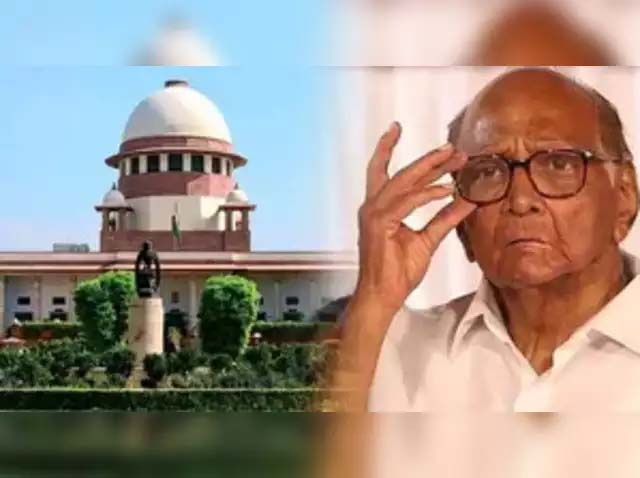In the hallowed chambers of the Supreme Court, a legal saga unfolds as Sharad Pawar mounts a challenge against an Election Commission edict acknowledging the Ajit Pawar-led faction as the bona fide Nationalist Congress Party (NCP).
A triumvirate of Justices—Surya Kant, Dipankar Datta, and KV Viswanathan—anticipates the auditory spectacle of Sharad Pawar’s plea. February 16 witnessed the apex court promptly queuing up the petition, propelled by Sharad Pawar’s apprehension about a potential whip from the Ajit Pawar-helmed faction. The seasoned statesman urgently sought a hearing, grappling with the dual setbacks suffered by his faction and the looming specter of repercussions for conceivable whip transgressions by his legislators.
Sharad Pawar sought celerity in light of the February 15 pronouncement by Maharashtra Assembly Speaker Rahul Narwekar. Narwekar adjudged that the NCP faction led by Ajit Pawar constituted the authentic NCP and that constitutional anti-defection provisions should not be wielded to quash internal dissidence. Preceding this, the electoral watchdog, on February 6, proclaimed the Ajit Pawar faction as the genuine NCP, bestowing upon them the party’s iconic ‘clock’ symbol.
The impending Maharashtra assembly session, set to commence on February 20, adds urgency to the legal skirmish. The NCP progenitor, Pawar senior, filed the petition through legal luminary Abhishek Jebaraj. Preemptively, the Ajit Pawar faction lodged a caveat in the Supreme Court through advocate Abhikalp Pratap Singh, guarding against ex-parte rulings favoring the Sharad Pawar contingent.
Ajit Pawar, currently donning the mantle of deputy chief minister in Maharashtra, orchestrated a political coup in July of the previous year, securing the allegiance of a majority of NCP MLAs and aligning with the BJP-Shiv Sena government under Eknath Shinde. The Election Commission, in a 140-page decree, asserted, “…this commission holds that the faction led by the petitioner, Sh Ajit Anantrao Pawar, is the Nationalist Congress Party (NCP) and is entitled to use its name and reserved symbol ‘clock’ for the purposes of the Election Symbols (Reservation and Allotment) Order, 1968.”
The commission underscored serious temporal incongruities in the Sharad Pawar group’s claim to organizational preeminence, rendering their assertions dubious. It expressed optimism about political entities adopting transparent practices in organizational elections and internal party democracy.
Subsequently, the assembly speaker’s ruling on February 15, coinciding with the top court’s stipulated deadline for addressing disqualification pleas, added another layer to the legal tapestry. The speaker, in an exhaustive decision, rebuffed disqualification petitions from both Ajit Pawar and Sharad Pawar factions, accentuating the “overwhelming legislative majority” wielded by the former when joining the Maharashtra government in July 2023.
Narwekar proclaimed the Ajit Pawar group as the “real political party” during the factional emergence, asserting, “All the petitions seeking disqualification of MLAs are rejected.” The speaker contended that dissenting against Sharad Pawar’s directives did not constitute defection but rather internal dissent. He decried the misuse of the tenth schedule of the Constitution, intended for legislator disqualification in cases of defection, emphasizing that party leadership should not exploit it to suppress dissent among members.
The legal milieu resonates with constitutional intricacies and political stratagem as the protagonists, Sharad Pawar and Ajit Pawar, navigate the labyrinth of legal proceedings, each vying for the imprimatur of the apex court to validate their faction’s claim to the NCP mantle.









